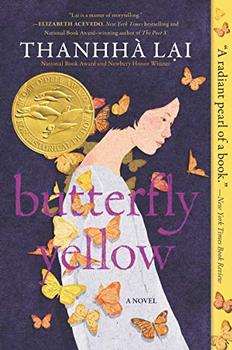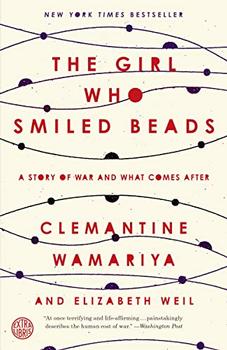Summary | Excerpt | Reviews | Beyond the book | Read-Alikes | Genres & Themes | Author Bio

A Novel
by NoViolet BulawayoLike the main character of her debut novel, We Need New Names, NoViolet Bulawayo is brave, scrappy, and not likely to back away from a fight. In these linked stories, she tackles - among other issues - poverty, political oppression, corruption, violence, women's rights, the class systems of Zimbabwe and the United States, and the problems of alienation at home and in a foreign land. The novel begins in Zimbabwe in 2008, during the months surrounding the country's failed elections and post-election violence. In less skillful hands, such a thematically dense work could easily come across as self-pitying or mired down in the bogs of the "African tragedy." Bulawayo confronts these challenges by giving us Darling, a no-nonsense ten-year-old narrator who stomps through life with a heart-wrenching, naked innocence.
It is easy to see why the first story, "Hitting Budapest," won the Caine Prize for African Writing. Darling's voice pops and sizzles. From the first paragraph, it grabs the reader by the throat and pulls her into the narrative:
We are on our way to Budapest: Bastard and Chipo, Godknows and Sbho and Stina and me. We are going even though we are not allowed to cross Mzilikazi Road, even though Bastard is supposed to be watching his little sister Fraction, even though Mother would kill me dead if she found out; we are just going. There are guavas to steal in Budapest, and right now I'd rather die for guavas.
Darling and her friends live in a shantytown aptly called Paradise, and it may as well be a different country from the affluent neighboring affluent community of Budapest. Paradise was created, we find out in later stories, when the government bulldozed the homes of Darling and her friends, most likely in Operation Murambatsvina, which in Shona means, "Getting rid of the filth." During this highly controversial campaign, the government demolished hundreds of thousands of structures, displacing between 300,000 and 1,000,000 people, largely poorer urban dwellers. It is widely claimed that the hidden agenda was to drive opposition-leaning urban dwellers into impoverished rural areas supportive of Mugabe. "They appeared with tin, with cardboard, with plastic, with nails and other things with which to build, and they tried to appear calm while putting up their shacks…" With fast-paced dialogue and straightforward prose, Bulawayo lays Darling's life bare. She and her friends are hungry. They are angry. Eleven-year-old Chipo is pregnant. They can no longer go to school because the teachers have all left the country. "We shout and we shout and we shout; we want to eat the thing she was eating, we want to hear our voices soar, we want our hunger to go away… [we] shout till we smell blood in our tickling throats." And always in the background is Zimbabwe, a country in the process of unraveling economically, socially, and politically.
"Sustaining adult interest in young protagonists is Harper Lee–hard," states Publishers Weekly in their review of Ru Freeman's On Sal Mal Lane. Bulawayo accomplishes this feat with grace, confidence, and humor. In the case of Darling, it is precisely her innocence and the startling, constantly surprising, persistently hopeful lens of her vision that allows Bulawayo to tackle so many issues without it seeming like a litany of misery. "It allowed me to play on the naivety and innocence and frankness of children to handle dense subject matter with an ease that may have otherwise been a bit more difficult had I been dealing with adult characters, " she says in a Los Angeles Review of Books interview.
What Darling searches for in the pages of theses stories is a home where she can feel at home. Her alienation begins when Zimbabwe plunges into economic free fall, and she and her family are driven from their original residence into Paradise. Even though Darling is closely bonded with her friends - the first part of the book is written in first person plural point of view - poverty excludes them from any hope of a future in their native land. Darling dreams of leaving Zimbabwe and following her aunt Fostalina to "Destroyedmichygen." Although she and so many others see the US as a cornucopia, her friend Bastard warns her about leaving: "you have to be able to return from wherever you go."
Darling does end up going to the US. From the moment she lands in Detroit, Michigan and sees a landscape of snow, she realizes that life in America will not be the Paradise she sought. "This is America, yo, you won't see none of that African shit up in this motherfucker," her cousin TK tells her. From this moment, too, Darling begins to understand that the notion of home is as complex as her relationship with her beloved Zimbabwe:
There are two homes inside my head; home before Paradise and home in Paradise; home one and two. Home one was best. A real house. Father and Mother having good jobs… And then home two – Paradise, with its tin tin tin.
There are three homes inside Mother's and Aunt Fostalina's heads: home before independence… Home after independence, when black people won the country… And then the home of things falling apart, which made Aunt Fostalina leave and come here. Home one, home two, and home three.
But even though America has serious challenges, even though Aunt Fostalina and her family struggle to keep their heads above water, even though Darling feels far more alienated in her new home than she did in her native country, she never gives up hope. She confronts life, whatever it brings, head-on. Darling is a survivor, and from her survival, we all take hope. Shortlisted for the Man Booker Prize and longlisted for the Guardian First Book Award, We Need New Names is NoViolet Bulawayo's love letter to Zimbabwe, and Darling is a character the reader will love long after the covers of the book have been closed.
![]() This review was originally published in The BookBrowse Review in September 2013, and has been updated for the
May 2014 edition.
Click here to go to this issue.
This review was originally published in The BookBrowse Review in September 2013, and has been updated for the
May 2014 edition.
Click here to go to this issue.

If you liked We Need New Names, try these:

by Thanhha Lai
Published 2020
Winner of the 2019 BookBrowse Award for Best Young Adult Novel
Perfect for fans of Elizabeth Acevedo, Ibi Zoboi, and Erika L. Sanchez, this gorgeously written and deeply moving own voices novel is the YA debut from the award-winning author of Inside Out & Back Again.

by Elizabeth Weil, Clemantine Wamariya
Published 2019
A riveting story of dislocation, survival, and the power of stories to break or save us.
Your guide toexceptional books
BookBrowse seeks out and recommends the best in contemporary fiction and nonfiction—books that not only engage and entertain but also deepen our understanding of ourselves and the world around us.